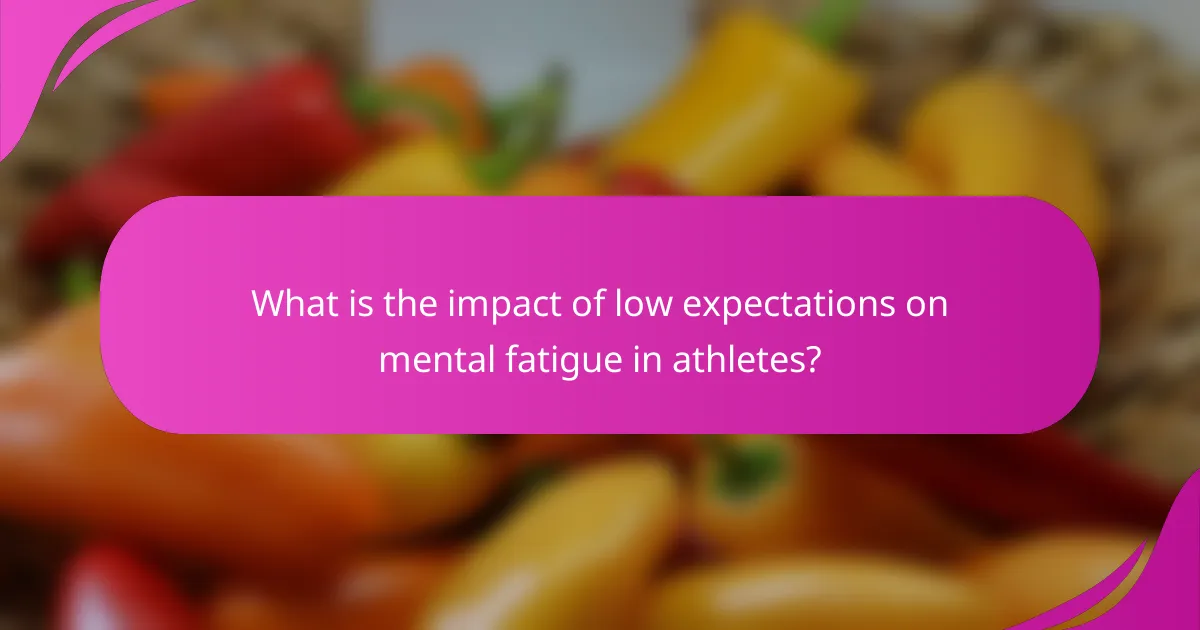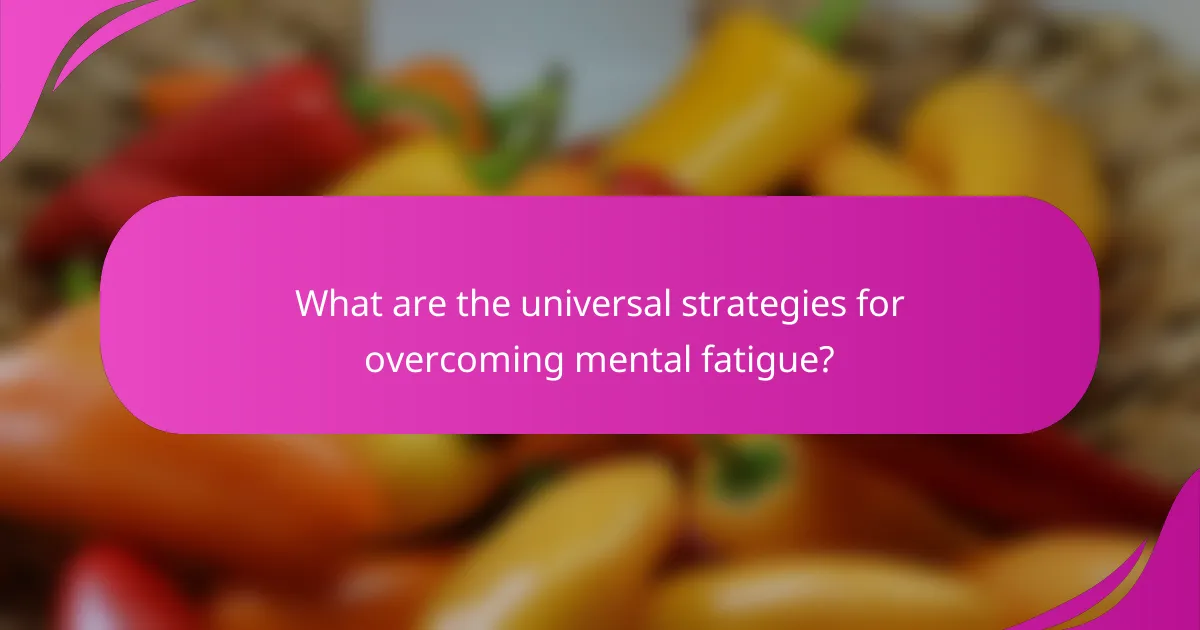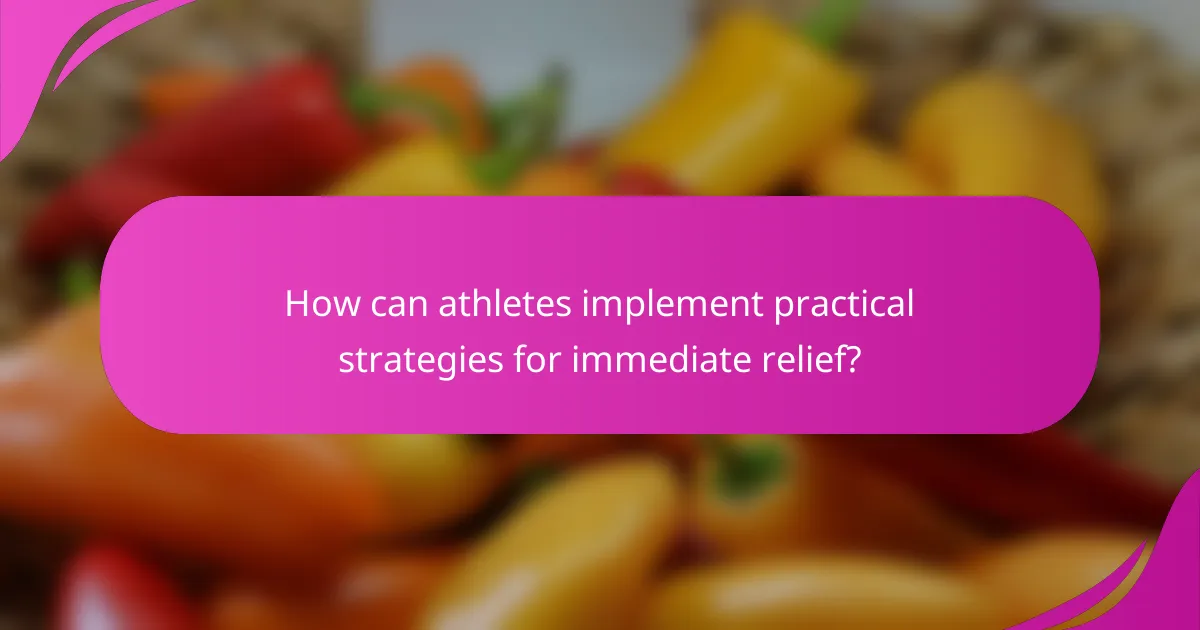Low expectations can hinder athletic performance and recovery by increasing mental fatigue. This article explores how setting realistic goals, prioritising rest, and incorporating mindfulness practices can combat these effects. Techniques such as cognitive restructuring and light physical activity will also be discussed to enhance mental stamina. By managing low expectations, athletes can improve focus and resilience, ultimately fostering better performance outcomes.

What is the impact of low expectations on mental fatigue in athletes?
Low expectations can significantly increase mental fatigue in athletes, hindering performance and recovery. When athletes doubt their abilities, motivation decreases, leading to a lack of effort and engagement in training. Research shows that low expectations correlate with increased stress and anxiety, which further exacerbates mental fatigue. Enhancing self-efficacy through positive reinforcement and goal-setting can combat these effects, promoting better mental stamina and overall athletic performance.
How do low expectations contribute to performance anxiety?
Low expectations can significantly heighten performance anxiety by creating a fear of failure. When athletes set low standards for themselves, they may feel pressured to meet even those diminished expectations, leading to stress. This phenomenon can result in mental fatigue, affecting focus and physical performance. Research indicates that maintaining a growth mindset, which encourages higher expectations, can alleviate anxiety and enhance recovery. Athletes who embrace challenges often perform better, as they are less burdened by the fear of not meeting low benchmarks.
What are the psychological effects of mental fatigue on athletic performance?
Mental fatigue negatively impacts athletic performance by reducing focus and motivation. Athletes may experience decreased reaction times and impaired decision-making. Studies show that mental fatigue can lower performance by up to 20%. Effective recovery strategies include rest, mental training, and mindfulness practices. Addressing mental fatigue is essential for maintaining optimal performance levels.

What are the universal strategies for overcoming mental fatigue?
To overcome mental fatigue, focus on setting low expectations, prioritising rest, and incorporating mindfulness practices. These strategies enhance recovery and performance.
1. Set realistic goals to avoid overwhelming pressure.
2. Schedule regular breaks to rejuvenate the mind.
3. Practice mindfulness or meditation to improve focus.
4. Engage in light physical activity to boost mood and energy.
How does proper rest and recovery mitigate mental fatigue?
Proper rest and recovery significantly reduce mental fatigue by allowing the brain to recharge and process information. Adequate sleep enhances cognitive functions, improving focus and decision-making. Research indicates that athletes who prioritise recovery experience better performance and lower stress levels. This holistic approach to recovery incorporates both physical and mental aspects, ensuring athletes maintain optimal mental health.
What role does nutrition play in mental recovery for athletes?
Nutrition is crucial for mental recovery in athletes, as it directly impacts cognitive function and mood. Proper intake of macronutrients, vitamins, and minerals supports brain health and reduces mental fatigue. For example, omega-3 fatty acids enhance cognitive performance, while hydration is essential for maintaining focus. Athletes should prioritise a balanced diet rich in whole foods to optimise recovery and performance.
How can mindfulness techniques assist in reducing mental fatigue?
Mindfulness techniques effectively reduce mental fatigue by promoting relaxation and focus. These practices enhance recovery and performance in athletes by decreasing stress levels and improving mental clarity. Techniques such as meditation and breathing exercises can lead to better emotional regulation and cognitive resilience. Studies indicate that regular mindfulness practice can significantly lower perceived fatigue, supporting optimal athletic performance.

What unique approaches can athletes take to manage low expectations?
Athletes can manage low expectations by adopting mindfulness techniques, setting realistic goals, and focusing on incremental progress. Mindfulness helps in reducing anxiety, allowing athletes to concentrate on the present moment. Setting realistic goals fosters a sense of achievement, which can enhance motivation. Incremental progress encourages a growth mindset, enabling athletes to appreciate their journey rather than fixating on outcomes.
How can goal-setting techniques shift an athlete’s mindset?
Goal-setting techniques can significantly enhance an athlete’s mindset by fostering resilience and focus. By setting specific, measurable, achievable, relevant, and time-bound (SMART) goals, athletes can combat mental fatigue and maintain motivation. This approach allows them to break down larger objectives into manageable tasks, creating a sense of accomplishment and reinforcing positive mental states. Additionally, regular goal reassessment helps athletes adapt their strategies, ensuring continuous improvement and optimal performance.
What is the significance of self-compassion in overcoming mental barriers?
Self-compassion significantly aids in overcoming mental barriers by fostering resilience and reducing mental fatigue. It encourages athletes to embrace imperfections, promoting a healthier mindset for optimal recovery. Research indicates that self-compassionate individuals experience lower levels of anxiety and stress, facilitating better performance. This unique attribute of self-compassion allows athletes to navigate challenges effectively, enhancing focus and motivation during training and recovery phases.

What rare techniques have proven effective for mental recovery?
Low expectations can enhance mental recovery by reducing pressure and promoting a relaxed mindset. Techniques include mindfulness meditation, which fosters awareness and acceptance, and visualization, which helps athletes mentally rehearse performance without stress. Another effective method is cognitive restructuring, where negative thoughts are reframed positively, promoting resilience. Finally, engaging in low-stakes practice can build confidence while minimising mental fatigue.
How can cognitive behavioural therapy enhance mental resilience?
Cognitive behavioural therapy enhances mental resilience by equipping individuals with strategies to manage low expectations and mental fatigue. It helps athletes identify negative thought patterns that hinder performance and recovery. By reframing these thoughts, athletes can foster a more positive mindset, leading to improved motivation and focus. Techniques such as goal-setting and cognitive restructuring promote better coping mechanisms, enabling athletes to navigate challenges effectively. As a result, mental resilience strengthens, supporting optimal athletic performance.
What innovative technologies are available for mental fatigue recovery?
Innovative technologies for mental fatigue recovery include neurofeedback, virtual reality therapy, and cognitive training apps. These technologies enhance cognitive function and promote relaxation, aiding athletes in optimal recovery. Neurofeedback utilises real-time brain activity monitoring to improve focus and emotional regulation. Virtual reality therapy immerses users in calming environments, reducing stress levels. Cognitive training apps offer personalised exercises to strengthen mental resilience. Each technology provides unique benefits, contributing to overall athletic performance.
What are the benefits of biofeedback in athletic performance?
Biofeedback enhances athletic performance by improving mental resilience and reducing mental fatigue. It trains athletes to recognise physiological signals, promoting better focus and relaxation. This leads to faster recovery and optimal performance during training and competition. Studies show that athletes using biofeedback report improved stress management and increased motivation.

How can athletes implement practical strategies for immediate relief?
Athletes can implement practical strategies for immediate relief by focusing on low expectations to manage mental fatigue. Techniques include mindfulness practices, such as deep breathing and visualization, which enhance focus and reduce stress. Engaging in light physical activity, like stretching or walking, can also alleviate tension. Prioritising rest and hydration supports recovery, helping athletes regain clarity and energy. Lastly, seeking social support from teammates or coaches fosters a positive environment, promoting resilience and mental well-being.
What are the best practices for integrating mental recovery into training routines?
Integrating mental recovery into training routines involves prioritising rest, mindfulness, and self-compassion. Establish regular downtime to prevent burnout, incorporate meditation to enhance focus, and practice self-acceptance to manage expectations. These strategies foster resilience, enabling athletes to recover mentally and perform optimally.
What common mistakes should athletes avoid in their recovery journey?
Athletes should avoid setting low expectations during recovery, as this can hinder mental resilience. Common mistakes include neglecting rest, underestimating the importance of nutrition, and failing to track progress. Prioritising a holistic recovery approach enhances performance and mental clarity.
How can peer support enhance recovery from mental fatigue?
Peer support significantly enhances recovery from mental fatigue by fostering a sense of belonging and shared experience. Engaging with peers provides emotional validation, reducing feelings of isolation. This support system can motivate individuals to adopt healthier coping strategies, ultimately improving mental resilience. Studies show that athletes who utilise peer support report lower levels of stress and higher recovery rates. Additionally, the unique attribute of peer encouragement can lead to enhanced performance outcomes, as individuals feel more accountable and inspired to push through mental barriers.